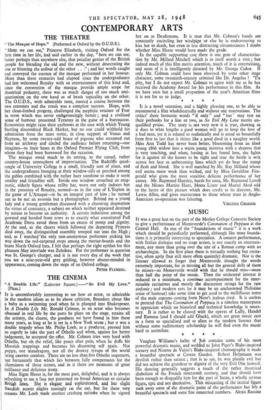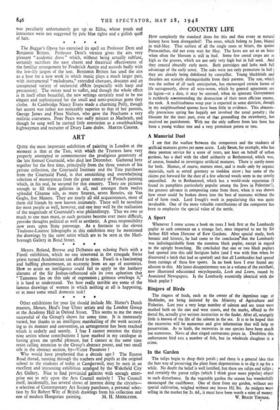MUSIC
IT was a great feat on the part of the Morley College Concerts Society to give a performance of Monteverde's Coronation of Poppaea at the Central Hall. As one of the "foundations of music" it is a work which should be periodically performed, although like most founda- tions it is primarily interesting to specialists. A concert performance, with Italian dialogue and no stage action, is not exactly an entertain- ment, any more than going over the site of a Roman camp with an archaeologist. In the first place there is virtually nothing but recita- tive, often aptly (but still more often quaintly) dramatic. Nor is the listener allowed to forget that Monteverde thought the words extremely important, for in missing. all but the general drift of them he misses—as Monteverde would wish that he should miss—more than half the point of the music. Then the orchestral interest is reduced to a minimum, a continuo accompaniment for the inter- minable recitatives and merely the discreetest strings for the rare sinfonie ; and modern ears (or it may be an unchastened Philistine sense of humour) take some time to get used to the mellifluous notes of the male soprano coming from Nero's jealous rival. It is useless to pretend that The Coronation of Poppaea is a timeless masterpiece to appreciate which no historical and technical knowledge is neces- sary. It is rather to be classed with the operas of Lully, Handel and Rameau (and I should add Gluck), which are great music cast in a form so specialised and so alien to the modern listener that without some rudimentary scholarship he will find even the music hard to assimilate. * * * *
Vaughan Williams's ballet of lob contains some of his most powerful dramatic music, and wedded to John Piper's Blake-inspired scenery and Ninette de Valois's Blake-inspired choreography it made a beautiful spectacle at Covent Garden. Robert Helpmann was devilish rather than satanic ; that is to say, he was plainly evil but did not achieve the grandeuror dignity of the very Evil One himself. His dancing generally suggests a touch of the rather theatrical diabolism of the French nineteenth century, and that should have been enough to disqualify him for the part of Satan, a wholly serious figure, epic and not decorative. This miscasting of the central figure took away some of the dramatic point of the performance but left a beautiful spectacle and some fine concerted numbers. Alexis Rassine
was peculiarly unfortunately got up as Elihu, whose youth and innocence were not suggested by pale blue tights and a girlish quiff of hair.
The Beggar's Opera has exercised its spell on Professor Dent and Benjamin Britten. Professor Dent's version gives the airs very pleasant "academic dress" which, without being actually subfusc, certainly sacrifices the easy charm and theatrical effectiveness of the familiar arrangement by Frederick Austin and accords badly with the low-life jargon of the text. Benjamin Britten has used the airs as a base for- a new work in which music plays a much larger part, with instrumental "melodrama," extended choruses, descants and an unexpected variety of orchestral effeCts (especially with harp and percussion). The voices tend to suffer, and though the whole effect is in itself often beautiful, the new settings certainly tend to be too elegant and sophisticated for the small and semi-precious gems they clothe. At Cambridge N'ancy Evans made a charming Polly, though her accent was rather too noticeably superior to that of her parents, George James and Flora Nielsen, who gave the Peachums a very rialistic coarseness. Peter Pears was sadly miscast as Macheath, and though he sang well he carried little conviction as a swashbuckling highwayman and recruiter of Drury Lane drabs. MARTIN COOPER.































 Previous page
Previous page